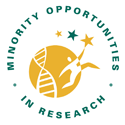NIGMS has re-announced the Research on Interventions (R01) program that supports research on efforts to increase student interest, motivation and preparedness for careers in biomedical and behavioral research. Proposed research should test assumptions and hypotheses regarding social and behavioral factors that might inform and guide interventions.
We are particularly interested in interventions that are specifically designed to increase the number of students from underrepresented groups entering careers in biomedical and behavioral sciences. However, you need not restrict proposed research to students from these groups. In fact, comparative research that analyzes the experience of all groups can help us understand how interventions should be tailored to make more underrepresented students successful in biomedical and behavioral careers.
We strongly encourage collaboration among biomedical, behavioral and social science researchers.
Currently funded projects are quite varied. Examples include research on interventions at the institutional level and on student characteristics, such as self-efficacy and leadership.
Letters of intent are due September 15, 2010, and applications are due October 15, 2010. For additional information about the program, see the funding opportunity announcement or contact me at 301-594-3900 or singhs@nigms.nih.gov.


